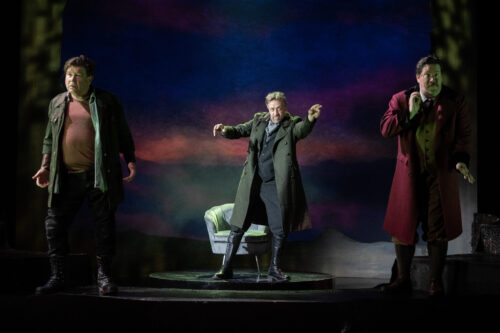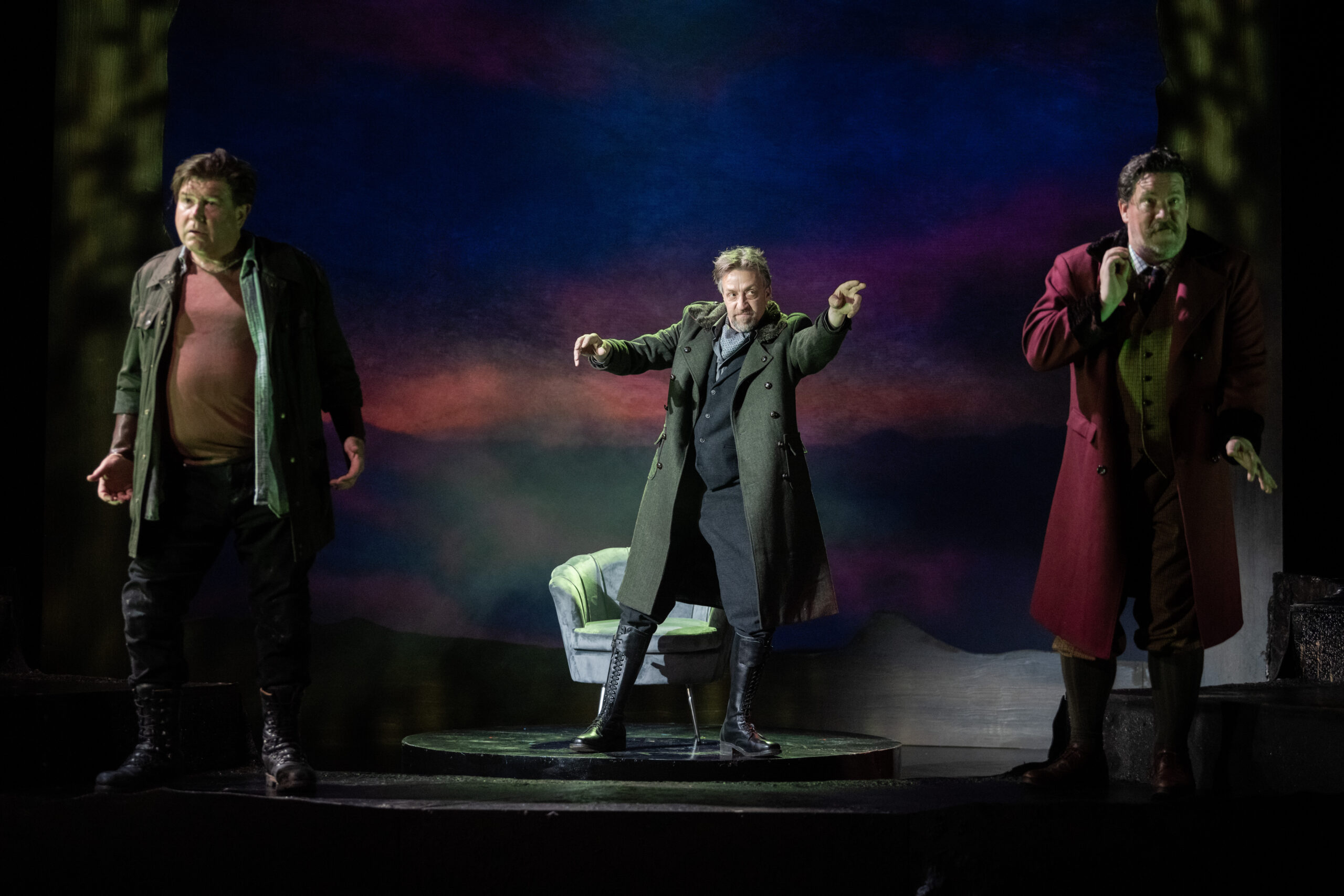 United Kingdom Longborough Festival Opera – Götterdämmerung: Soloists, Longborough Community Chorus, Festival Chorus and Opera Orchestra / Anthony Negus (conductor). Longborough Festival Opera, Moreton-in-Marsh, 31.5.2023. (JPr)
United Kingdom Longborough Festival Opera – Götterdämmerung: Soloists, Longborough Community Chorus, Festival Chorus and Opera Orchestra / Anthony Negus (conductor). Longborough Festival Opera, Moreton-in-Marsh, 31.5.2023. (JPr)

Production:
Director – Amy Lane,
Set and Props designer – Rhiannon Newman Brown
Costume designer – Emma Ryott
Lighting designer – Charlie Morgan Jones
Video designer – Tim Baxter
Chorus master – Peter Selwyn
Cast:
Brünnhilde – Lee Bissett
Siegfried – Bradley Daley
Hagen – Julian Close
Gunther – Benedict Nelson
Gutrune – Laure Meloy
Waltraute – Catherine Carby
Alberich – Freddie Tong
First Norn – Mae Heydorn
Second Norn – Harriet Williams
Third Norn – Katie Lowe
Woglinde – Mari Wyn Williams
Wellgunde – Rebecca Afonwy-Jones
Flosshilde – Katie Stevenson
In the original Star Trek series of the late 1960s there is a famous episode called ‘The City on the Edge of Forever’ which – to cut a complex story short – features a time portal on a mysterious planet (weren’t they all?) called the ‘Guardian of Forever’, which could transport people going through it to any historical time and place. Götterdämmerung now completes the third Ring cycle in Longborough Festival Opera’s 25-year history and Rhiannon Newman Brown’s set has, centrally and slightly raised, a small circular podium with – on either side – just two shallow steps. It is all dominated by a framed screen to the rear which acts like the ‘Guardian of Forever’ such that – along with Tim Baxter’s mostly ever-changing images and Charlie Morgan Jones’s very effective lighting – brings essential atmosphere to the drama unfolding in front of it. It features – amongst much else – water (falling rain, swirling torrents, whirlpools), sky (sunrises, sunsets, a full moon, threatening clouds), scenery (lakes, rivers, mountains), flames, molten gold, a galloping horse and a brutalist-looking Valhalla as a grey concrete bunker.
Everybody watching will experience something different while watching this Götterdämmerung, but it all worked to splendid effect in the third act (the best one!) as the Rhinemaidens ‘splash around’ and ‘soak’ Siegfried (no spoilers here in case you will be seeing this sometime). Emma Ryott’s eclectic costumes include ‘traditional’ Norns, Rhinemaidens and Waltraute; elsewhere they are more contemporary and Siegfried and, especially, Brünnhilde looked as if they had just wandered into a rehearsal room. Gunther had the appearance of a country squire in his red frock coat and tweed waistcoat, Gutrune began as if ready for a day at the office and Hagen was in a suit and greatcoat. The vassals all wear trench coats with hats or caps on their heads and the well-characterised, manic Alberich (Freddie Tong) in his dirty rags is obviously down on his luck. Overcoats appear an important motif to director Amy Lane as Waltraute brings Wotan’s to her confrontation with her sister Brünnhilde and they are used to cover Siegfried on his bier.
This standalone Götterdämmerung has a few puzzling moments that might be made clearer to those seeing the entire cycle next season (which unfortunately I won’t be). The Norns leave what looks like the score for the opera as they – very reluctantly here – depart having brought us up-to-date with the story so far whilst manipulating the roots of the World Ash Tree against a backdrop redolent of Casper David Friedrich. They will then lead in Siegfried and Brünnhilde whose mountaintop – still corralled by four spears as in Siegfried – finds them chilling out the morning after the night before. Siegfried sets off on his ‘deeds of glory’ with sword, horn and Tarnhelm (having given the ring to Brünnhilde) and arrives at the Gibichung Hall with its single armchair and apparently lit by two circular pendants overhead. In Act II Hagen summons the vassals to his artist’s studio with portraits of Wotan and the other gods and he begins to make sketches of some of the characters in a notebook (was this what the Norns left, I am not sure). Siegfried will eventually bid his farewell to Brünnhilde holding her image torn from it. Hagen is puppet master extraordinaire and has the power to bend others to his will. He enjoys a drink too and looks as if he is in a drunken stupor when an overwrought Alberich demands he reclaims the ring. At one point or another some of the characters will look as if they are suffering with either a migraine or heartburn.
As for the incandescent climax to Götterdämmerung, most will know that Siegfried is drugged, betrays Brünnhilde who swears vengeance on him and brings about his death at Hagen’s hands. Too late she understands that he was the innocent victim after all and that his death has made her all-knowing and as a free agent she can assuage Wotan’s guilt, cleanse the ring of its curse, and return it to the Rhinemaidens. Lane orchestrates something of a happy ending and as flickering flames surrounds the entire audience in Longborough’s 500-seat opera house, Siegfried and Brünnhilde are reunited in death and Wotan is there too. I repeat here how Richard Jones in the 1990s responded when asked what his Covent Garden Ring cycle meant and replied ‘Well, what does it mean to you?’ I suspect everybody present next year will have their own ideas about what Any Lane is wanting them to understand from everything they will have seen and heard.
There is no doubting that – in my opinion and experience – this was the finest Wagner performance I have heard at Longborough. The horns especially were on top form as was every member of the just over 60-strong Festival Orchestra. There were so very many marvellous passages, and – now-legendary Wagner conductor – Anthony Negus clearly loves this score (it was also the best part of his recent Melbourne Opera Ring cycle, review here) and, as ever, he fulfils the composer’s need for music drama by getting them to help tell the tale straightforwardly, without undue reverence or unnecessary re-interpretation. Negus’s approach may seem rather swift but isn’t really any different than you will get from many contemporary Ring conductors and is entirely appropriate because Negus keeps such strict control over tempo and rhythm. Highlights included Hagen’s call to the vassals brilliantly voiced by Julian Close and Longborough’s stentorian Peter Selwyn-marshalled Community Chorus and Festival Chorus. Also, Siegfried’s Funeral Music made its full impact and – as a deeply affecting musical eulogy – was as good as I have heard anywhere. In fact, musically this was a near-perfect Götterdämmerung through to the climactic and world-ending closing bars; even though you might be left wishing, like me, the music could just go on and on.

Some of this excellence extended to a fine cast, again as good as any Longborough has fielded for its Wagner. Towering (literally!) over them all was sonorous and cavernous bass Julian Close’s baleful Hagen who was immutable, implacable and evil incarnate. I will not single out any of the Norns (Mae Heydorn, Harriet Williams, Katie Lowe) or Rhinemaidens (Mari Wyn Williams, Rebecca Afonwy-Jones, Katie Stevenson) because I cannot remember better trios. Benedict Nelson’s intelligent performance made something quite different of Gunther: he cannot be other than dislikeable, but Nelson – with his rich baritone – portrays him as a thoroughly human ruler who is wrestling with his own mediocrity, and who shows genuine remorse at what happens to Siegfried. Laure Meloy’s well-sung Gutrune was timid, lovelorn, easily manipulated and ultimately sorrowful. One of the high points of this Götterdämmerung was when Catherine Carby with her expressive mezzo-soprano sang a magisterial ‘Waltraute’s Narration’ which was riveting and scaled the dramatic heights.
Lee Bisset and Bradley Daley were once again Brünnhilde and Siegfried. Bisset’s experience showed by not letting the role’s emotions get out of hand and become the substitute for attempting some cultured singing. When it came to the ‘Immolation Scene’ Bisset proved herself a consummate storyteller as Brünnhilde clutched that ubiquitous book and – with a secure middle voice – it was the quiet pathos she brought to her singing which stood out rather than any visceral excitement from her highest notes which – slightly strident on this occasion – perhaps suffered from the fact that the premiere had only been two days earlier.
Siegfried falls into the traps set for him by the scheming amoral Gibichungs much too readily and so must come across as guileless. The open-faced Bradley Daley did this well, and created a rounded character whilst singing subtly, tirelessly, and with firm and strong top notes. It may not be the most ringing or lyrical of heroic tenors, but he is better than many of the current Siegfrieds and I much prefer him to Andreas Schager (to name just one). Maybe his appearance as Gunther at the end of Act I could be rethought because he made me laugh when supposedly disguised by a top hat/Tarnhelm and Gunther’s frock coat, but he mimicked Nelson’s baritone exceptionally well. A very minor blemish in some more unforgettable Longborough Festival Opera Wagner.
Jim Pritchard
For more about Longborough Festival Opera click here.
